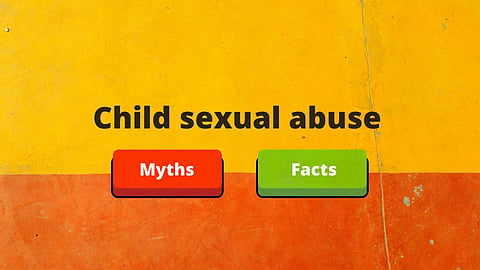
- Mental health mattersMental health matters
- Mental IllnessMental Illness
- Life stagesLife stages
- Caregiving
- Workplace Mental Health
- Legal Matters
- Subscribe

Myth: Child sexual abuse happens only to girl children
Fact: Gender has nothing to do with whether a child has been abused or not. The study on Child Abuse in India, carried out by the Ministry of Women and Child Development in 2007, found that 52.94 per cent of children who reported facing one or more forms of sexual abuse were male. Unfortunately, the abuse of boys is sometimes viewed as an initiation to sexual activity, rather than violation of the child’s physical, emotional and sexual safety.
Myth: My child won’t get abused. I am very careful to not leave them in the care of strangers.
Fact: In many cases, the children are violated by someone familiar - someone who the child and their parents know well and trust. One of the major findings of the 2007 study was that 50 per cent of the abusers were cousins, uncles, friends and classmates.
Myth: It only happens in lower-income families. I don’t think I know anyone who has been abused. It doesn’t happen in India.
Fact: Sexual abuse cuts across all gender, nationality, social status or economic divides.
Myth: Children are young. They will grow up and forget about it.
Fact: The effects of child sexual abuse can have a long term impact on the child’s mental health. The immediate impact of child sexual abuse could include withdrawal, fearfulness, or - in some cases - aggression. The child is at risk for depression, PTSD and dissociative disorders or adjustment disorders. In the long term, a child who has experienced abuse may have negative self perception, have difficulty trusting people and could be in abusive relationships throughout their life. There is a greater likelihood that a child who has suffered abuse develops mental health problems during adolescence or adulthood.
Myth: Reporting child sexual abuse can have a negative impact on the child’s future.
Fact: The POCSO act (Protection Of Children from Sexual Offences) passed by the Indian government makes reporting of child sexual abuse mandatory (hospitals are mandated to report). If the child’s family decides to take up the case against the perpetrator, the act offers a number of provisions to protect the child. For example, the child’s statement is recorded in the presence of a trusted adult, the child’s identity is never disclosed during or after trial, experts are available in court for the child’s assistance (eg.counselor, special educator, translator) etc.
When a case of child sexual abuse is not reported, the perpetrator not only goes scot-free but may also go on to abusing many other children afterwards.
Myth: Only men sexually abuse children.
Fact: Although a majority of perpetrators are men, a small percentage of women (roughly about 4%) have also been reported to have abused children sexually. Cases of female offenders are usually under reported, largely because a female offender abusing a young boy is often understood as sexual initiation and is therefore not taken seriously by anyone.
Myth: Only young children are abused.
Fact: Child sexual abuse can happen to older children too. In fact, the 2007 study revealed that pre-adolescent and adolescent children were most at risk. As many as 73 per cent of the total child sexual abuse incidence cases that were reported were among children between the ages of 11 and 18 years.
Myth: There’s no way this person, who is so successful and kind, could have abused the child. The child must be making it up.
Fact: People who sexually abuse children do not look any different from other people. In her book, Predators: Pedophiles, Rapists, And Other Sex Offenders, psychologist Dr Anna C Salter, an internationally known authority on sex offenders, states that perpetrators are never the monsters we imagine them to be. Often, they are men and women who are so ‘charming and well-liked’ by everyone else. Sometimes, they may even demonstrate a socially responsible and caring attitude in public, making it easy for everyone to respect them. Most offenders spend time establishing a rapport with the children and winning their trust before abusing them. Children do not lie or make false accusations about being sexually abused.
We are a not-for-profit organization that relies on donations to deliver knowledge solutions in mental health. We urge you to donate to White Swan Foundation. Your donation, however small, will enable us to further enhance the richness of our portal and serve many more people. Please click here to support us.
